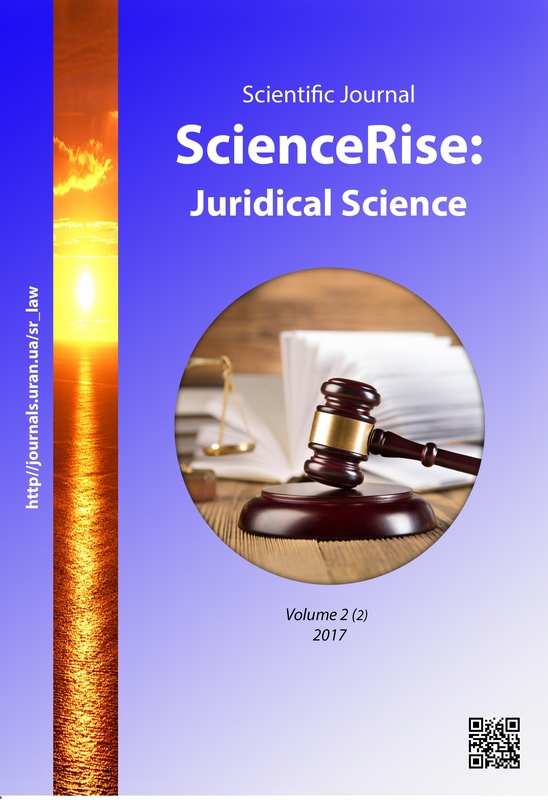Methodological paradigm of the scientific knowledge of law
DOI:
https://doi.org/10.15587/2523-4153.2017.119853Keywords:
scientific methodology, dialectics, method of ascending from abstract to concrete, scientific theory, dialectical theory of lawAbstract
The article reveals the importance of scientific methodology in the development of legal science, especially dialectics, as a general scientific method in the methodological system of scientific knowledge. It is noted the presence of numerous definitions of the concept of law and legal theories; a critical assessment of the explanation of this situation is given by the fact that researchers do not take into account in the scientific knowledge the dual function of the concept; Criticism of "universal principles of constructing a scientific theory of law" from the point of view of dialectical logic is also given. It is substantiated that the basis of the scientific methodology of cognition of law is general method of ascension from the abstract to the concrete as the only correct in the scientific sense.
Indicated on the negative role of "methodological pluralism", which prevails in legal science and denies objectively necessary for science methodological monism. In this connection, the relationship between science and ideology is considered, it is stated that the status of ideology as a form of social consciousness is not identical to the position of science, they have different genesis and functions. The epistemological aspect of this relation is revealed, according to which the roots of ideology must be sought in utopia and the ontological aspect accordind to which the basis of ideological pluralism is the presence of various partial interests.
Noted the peculiarity of Marxism as a scientific trend, the significance of the method of ascent from the abstract to the concrete for the formation of the dialectical theory of law on the basis of the only correct scientific methodology
References
- Dynin, B. S. (1972). K voprosu o haraktere problem metodologii: Filosofiya. Metodologiya. Nauka. Moscow: Izd-vo «Nauka», 236.
- Rachkov, P. A. (174). Naukovedenie. Problemy, struktura, elementy. Moscow: Izd-vo Moskovskogo universiteta, 242.
- Kohanovskiy, V. P. et. al. (2006). Filosofiya nauki v voprosah i otvetah. Rostov-na-Donu: Feniks, 352.
- Bekbaev, E. Z. (2014). O dvuh funktsiyah ponyatiy v nauchnom poznanii prava. Zhurnal rossiyskogo prava, 9, 18–26.
- Ivakin, O. A. (2003). Dialektychna filosofiia. Odessa: Yurydychna literatura, 352.
- Yushchyk, O. I. (1997). Pravova reforma: zahalne poniattia, problemy zdiysnennia v Ukraini. Kyiv, 192.
- Marks, K., Engel's, F. Sochineniya. Vol. 46, Ch. 1.
- Yushchik, A. I. (2013). Dialektika prava. Kyiv: Red. zhurn. «Pravo Ukrainy»; Іn Yure.
- Lenin, V. I. Povnyi zibrnyk tvoriv. Vol. 29.
- Marks, K., Engel's, F. Sochineniya. Vol. 20.
- Yushchyk, O. (2016). Kryza pravorozuminnia i dialektychna teoriya prava. Pravo Ukrainy, 3, 258–265.
- Kara-Murza, S. G. (2002). Ideologiya i mat' ee nauka. Moscow: Izd-vo Eksmo, 256.
- Suprun, V. I. (1990). Nauka i ideologiya: Nauka i ee mesto v kul'ture. Novosibirsk: Nauka, Sib. otd-nie, 274.
- Elez, Y. (1973). Kategoriya praktiki v trudah K. Marksa: Praktika i poznanie. Moscow: Izd-vo «Nauka», 360.
- Yushchyk, O. I. (2002). Haluzi ta instytuty pravovoi systemy (mify i realnist). Kyiv: Oriyany, 112.
- Lenin, V. I. Povnyi zibrnyk tvoriv. Vol. 18.
- Yushchik, A. I. (2013). Dialektika prava. Kn. 1: Obshchee uchenie o prave (Kriticheskiy analiz obshchepravovyh ponyatiy). Ch. ІІ. Kyiv: Red. zhurn. «Pravo Ukrainy»; Іn Yure, 768.
- Yushchyk, O. (2016). Metod dialektychnoi teoriy prava yak kryteriy yii naukovoi novyzny. Pravo Ukrainy, 5, 155–163.
Downloads
Published
How to Cite
Issue
Section
License
Copyright (c) 2018 Oleksii Yuschik

This work is licensed under a Creative Commons Attribution 4.0 International License.
Our journal abides by the Creative Commons CC BY copyright rights and permissions for open access journals.
Authors, who are published in this journal, agree to the following conditions:
1. The authors reserve the right to authorship of the work and pass the first publication right of this work to the journal under the terms of a Creative Commons CC BY, which allows others to freely distribute the published research with the obligatory reference to the authors of the original work and the first publication of the work in this journal.
2. The authors have the right to conclude separate supplement agreements that relate to non-exclusive work distribution in the form in which it has been published by the journal (for example, to upload the work to the online storage of the journal or publish it as part of a monograph), provided that the reference to the first publication of the work in this journal is included.








